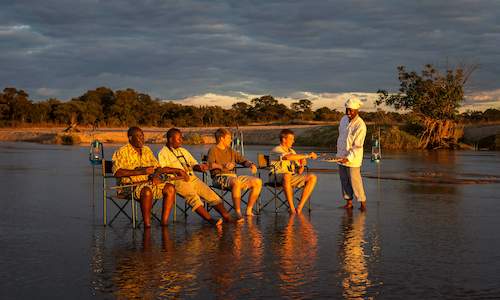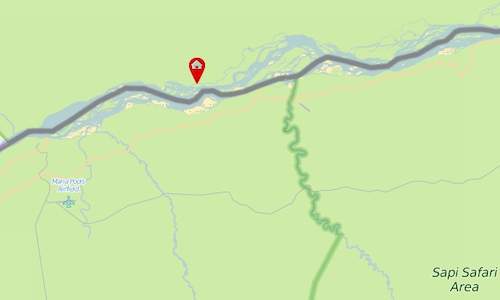
Area
Zambia covers an area of 752,614 sq km.Official Language
English is the official language of Zambia. Bemba is the most commonly understood local language, and more than 73 other regional dialects are also spoken.Population
Population: 12 million people plus
Population Density: 13 people per sq km.
Capital: Lusaka. Population: 2 million people plus
On average 99% of the population is made up of black people from the 73 indigenous tribal groups. The main ethnic groups are the Bemba, Kaonda, Nyanja, Lozi, Lunda, Luvale, and Tongo. The other 1% of the population is made up of Asians of Indian origin, coloureds of Euro-African/Indo-African origin and white people of British origin.
The main language spoken in Zambia is English. The ethnic groups have their own languages as well.
Time Zone of Zambia
Zambia is two hours ahead of Greenwich Mean Time (GMT +2 hours), one hour ahead of Central European Time, seven hours ahead of Eastern USA time and ten hours ahead of Western USA.Capital City - Lusaka
Lusaka is the capital city of Zambia. This is a very busy city with hundreds of street vendors and bustling market stalls ready to offer you various arts and crafts made from copper and wood.
Almost anything can be bought at the markets. While wandering the streets, you can visit one of the many restaurants available. Please note that when you buy food from restaurants, always ensure that the food is hot and freshly prepared. It's not nice to end up with stomach bug on ones holiday and with the myriad of restaurants, safe and good food is readily available.
Lusaka is not as well developed as other capital cities in the world, but it has its own African energy. Only 20% of Zambia has tarred roads. The city is always undergoing some changes which consist of new shops, markets, fast food venues, new road development, upgrading of parks and buildings and an occasional multi-million dollar shopping mall.
As one of the fastest growing cities in Africa, Lusaka's population has trebled over the years. Many of the municipal facilities are not adequate to meet the demand. Please ensure that if you have medical ailments to bring enough medication along with you as the hospitals and pharmacies are very basic.
At night you can visit one of the local nightclubs and enjoy a few drinks or dance the night away. Zambia has a variety of nightclubs, from Irish Pubs, boat clubs, local hangouts to up-market venues. While most of the venues have no dress code, when you go to the upmarket venues, jeans are not allowed.
While in Lusaka you will have great travel access. The city is central to all the highways. From Lusaka International Airport, you will get flights to most of the major tourist destinations in Zambia.
Weather and Climate
Zambia features three weather phases, December to April is warm and wet, May to August cools down a bit and gets dry, then from September to November it's hot and dry. October is usually the hottest month. With these three weather phases you can enjoy the best of the Luangwa Valley, Victoria Falls and the Lower Zambezi.Best Time of the Year to Visit Zambia
Game viewing and safaris can be enjoyed all year round. While Victoria Falls is a year round beauty, the best time of the year to see the Falls is from April to May. For the white water activities at the Falls, November and December are the best months to visit.
Best time of the year for a walking safari in South Luangwa is during April to November when the land is dryer.
System of Government
The government of Zambia (formerly Northern Rhodesia) is elected in a multi-party general election every five years. Up until 1991, the country was under Kenneth Kaunda in a one party state. The Movement for Multiparty Democracy (MMD) and their current leader Levy Patrick Mwanawasa, are now the ruling government for the third term.Local Currency
While you are travelling with Siiyabona Africa - at must you should be carrying US $'s.For the purposes of tipping - have some $1 and $5 bills.
For any airport or border crossing taxes carry $10's and $20's.
The same applies for purchasing souvenirs - although it can be handy to have Kwacha for small loacal purchases Speak to your Siyabona consultant about this.
The official currency of Zambia is the Kwacha (K) which is divided into 100 Ngwee.
The Kwacha has denominations of 50, 100, 500, 1000, 5000 and 10 000, 20 000 and 50 000 notes.
The rate fluctuates on a daily basis, so you will need to check with the Bureaux de Change.
Zambia does not set a limit on bringing foreign currency into the country, but it must be declared upon arrival on a currency declaration form.
Bank Opening Hours?
Zambia has a variety of local banks and some international banks, such as Barclays Bank and Standard Charter. The usual operating hours of the banks is 08:15am to 14:30pm from Mondays to Fridays and 08:15am to 10:30am on the first and last Saturdays of the month. Foreign currency can also get exchanged at some of the banks.
Credit Card payments
Most of the hotels, restaurants, eateries, travel agencies and bigger shops accept credit cards. The bigger banks will provide you with local currency against your credit card. Standard Chartered, Stanbic and Barclays Banks have ATM's which accept Visa cards for cash.Tipping
Tipping is discouraged as it is included as the service charge on your bill. When not charged as part of your bill, you can tip an average of 10% which will be sincerely appreciated.Country Dialing Code of Zambia
Zambia's country code is 260 and the international dialling code is 00.Public Communications Media
While in Zambia you will find telephones which require tokens in the post offices and a number of buildings. The tokens can be bought at the post office or one of the shops in the city. In Lusaka there are shops which offer phone, fax, post and wi-fi. Most communication services are available in post offices and internet cafes in Lusaka and Livingstone.

 Zambia boasts abundant wildlife, beautiful sights, breathtaking lakes and wetlands, and the magnificent Victoria Falls. Best Times to Visit ...
Zambia boasts abundant wildlife, beautiful sights, breathtaking lakes and wetlands, and the magnificent Victoria Falls. Best Times to Visit ... View a map of Zambia....
View a map of Zambia....